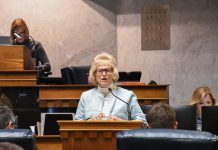Dennis said he was prepared to take the matter to the city council, “and if they approve, keep it active.â€
Peter Bunder, West Lafayette City Council president, said he believed the council was prepared to back Dennis and had essentially said that during a city council meeting in early August.
“I’m sure we’d do that in a heartbeat,†Bunder said. “None of us minded that John did what he did. If we need to, we’ll step up.â€
Bryant was not immediately available for comment Tuesday.
Bryant’s attorney, Kokomo-based Arie Lipinski, said nothing was stopping the city council from doing what Dennis tried to do, “but at least the people of West Lafayette will have the opportunity to express their concerns at the meeting.â€
“I can’t imagine why the city council members would want a mask mandate that is enforceable by the punishment of fine so badly that they exercise their law-making authority to accomplish that goal,” Lipinski said. “But apparently the COVID-19 pandemic presented the perfect opportunity for government entities/officials to abuse their power to impose restrictions on citizens under the threat of punishment.
“This may seem like a petty lawsuit, but the lack of push back over state and local executives who have exceeded their authority and usurped power that is inherent in the citizens – by imposing restrictions via executive order under the guise of protecting public health – is concerning.â€
During a hearing Aug. 25, Persin said he wasn’t interested in arguing about whether masks worked or didn’t work in curbing the spread of COVID-19. Dennis said that was his intent when he issued the July 13 executive order for people to wear face coverings when in spaces where social distancing wasn’t possible.
Instead, Persin told the city’s attorneys and Bryant that he was only interested in whether state law and city code made the rare executive order legitimate.
Bryant claimed that there “are less restrictive and potentially more rational means of slowing the spread” of COVID-19 and that those steps if taken by West Lafayette, should come with the backing of a majority vote on the nine-member city council.
The city defended the order, saying Dennis was well within his powers to base his executive order on the city’s nuisance ordinance to protect residents in what attorney Zach Williams called “an unprecedented time.â€
Last week, Gov. Eric Holcomb extended that state’s mask order through September. That order does not come with fines or other penalties.
Dennis has said he issued the order, in part, to mesh the city with similar rules instituted this summer on Purdue’s West Lafayette campus. The order came with fines already in city code: $100 for the first violation and $250 for the next one.
Dennis said when he issued the mask mandate that racking up fines wasn’t the goal. A message rooted in emerging science about how masks limited the spread of exhaled, airborne droplets carrying the virus and Centers for Disease Control and Prevention-recommended safe practices during the pandemic was.
The city has not issued a mask-related citation.
West Lafayette’s defense leaned heavily a U.S. Supreme Court ruling in Jacobson v. Massachusetts, a 1905 case based on a pastor’s refusal to comply with vaccinations required during a smallpox outbreak, based on his religious convictions. The Supreme Court ruled 7-2 that individual rights, in the case of a public health emergency, had to stand aside for the common good.
The ruling has been a popular one in 2020, as communities defend challenges of health orders tied to the COVID-19 pandemic. During an Aug. 25 hearing, Persin told the city he didn’t consider Jacobson v. Massachusetts to be a rubber stamp for government mandates during the pandemic.
City attorneys responded with a follow-up filing late last week about the mayor’s use of city nuisance ordinances, rather than waiting for the city council to act.
“The mayor’s order is not an overreach, it is his duty under law,†Williams wrote. “The dead don’t have a say in whether this minor inconvenience is worth the potential of saving even one of our friends, neighbors, students or family members.â€
Persin on Aug. 25 dismissed four of Bryant’s five counts against the city. Among them were Bryant’s claims that wearing a mask limited his freedom of speech; that it made it impossible for him to effectively protest the mandate; gave police additional reasons to stop residents for illegal searches; and set up those who declined to wear masks for unfair political backlash he claimed came from being labeled as President Donald “Trump supporters.â€
The city argued that the First Amendment challenges regarding freedom of speech and the right to protest fell flat, saying that Bryant was free to stand in front of city hall if he wanted – even without a mask if he could keep a six-foot distance from others – and protest the order. And if the social distance was an issue, he could speak louder through the mask, Williams said.
That left what Persin said was the crucial matter, as outlined in Bryant’s lawsuit: “One man’s opinion should not dictate whether a mask-wearing mandate is rationally related to the goal of preventing the spread.â€
Persin decided it shouldn’t in this case. Persin said state code gave health departments latitude to issue mask orders and other restrictions to address community illnesses, such as COVID-19.
“The Indiana Legislature has not given this same authority to mayors,†Persin wrote.
Persin said the city’s nuisance ordinance “primarily addresses buildings.â€
“If the West Lafayette City Council elects to authorize the mayor to take certain action to stop disease, they must articulate clear intent,†Persin wrote.
After last week’s hearing, Nick DeBoer, a West Lafayette City Council member, called the legal challenge “all a bit of Kabuki theater,†saying the council was ready to act as soon as its Sept. 8 meeting.
“I thought the mayor’s authority under existing law was explicit,†DeBoer said. “No reason to add more laws to the books if you already have one that covers it. But if the judge disagrees, we’ll do it then.â€
Roger Stark was at the Aug. 25 hearing in Tippecanoe Circuit Court, prepared to testify in support of Bryant’s case. Stark – a West Lafayette resident who also authored a petition protesting Tippecanoe County Health Department restrictions on restaurants and bars – was never called, as the judge focused on questions of the mayor’s authority rather than opinions about civil rights or health benefits of masks.
“Today was a win for keeping our mayor’s authority in check,†Stark said. “If this is taken to the city council, I’m prepared to debate the science of face coverings.â€




